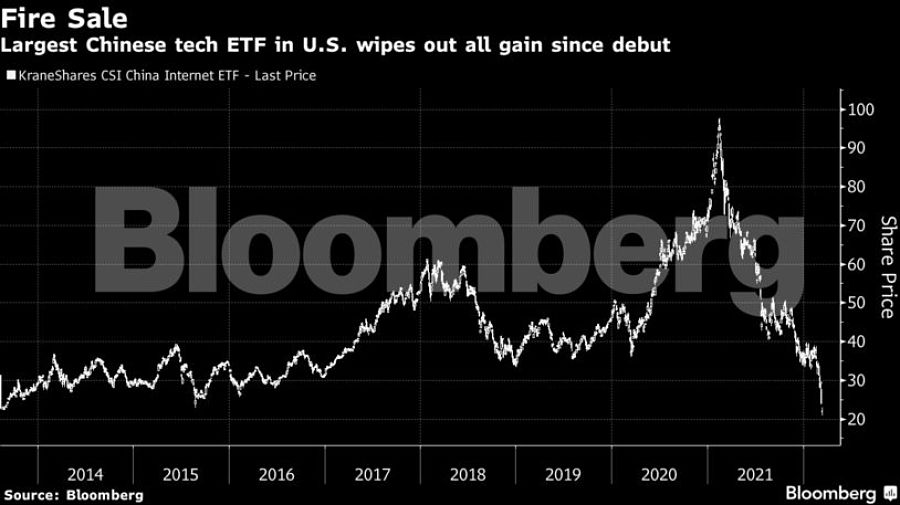

The selloff in Chinese stocks has been so intense that it’s erased all the gains in the largest China tech ETF in the U.S. since the debut in 2013.
KraneShares CSI China Internet Fund (KWEB), a $4.9 billion exchange-traded fund that invests in Chinese tech companies, slumped more than 11% Monday, bringing its decline over the past three days to 28%. Its loss this year has surpassed 42%, wiping out all the gains, including dividend payouts, since it started trading nine years ago.

Even as the stock tumbled, the ETF posted consistent inflows in January and February before those flows reversed course this month. The buy-the-dip strategy proved no match for a broader selloff as a confluence of factors, including renewed concerns about the delisting of American Depositary Receipts from U.S. exchanges, Covid outbreaks in China and the geopolitical tension stemming from Beijing’s position in the Russia-Ukraine war weighed on sentiment. JPMorgan Chase & Co. downgraded 28 Chinese stocks trading in the U.S. and Hong Kong Monday, saying the companies are “uninvestable” on a six- to 12-month horizon.
“The China internet space needs catalysts, which are currently few and far between, for buyers to come back in,” wrote Brendan Ahern, chief investment officer at Krane Funds Advisors LLC, which manages the ETF, wrote in a blog post titled “Sum of All Fears” on Monday. ”Positive news on the Russia/Ukraine conflict, better vaccines in China, buybacks, go private deals, and spinoffs are all potential candidates to revive the sector.”
The KWEB’s assets has almost halved since peaking at nearly $10 billion in November, despite persistent inflows to the fund. It still ranks as the second-largest China-focused ETF in the U.S., trailing only the $5.5 billion iShares MSCI China ETF. Its shares outstanding jumped more than 200% between mid-July and February as investors piled on.
Five companies, including Tencent Holdings Ltd., Alibaba Group Holding Ltd., JD.com Inc., Baidu Inc. and Meituan, accounted for 46% of KWEB’s holdings. The decline of these companies this year ranges from 25% to 50%.
On Friday, Krane Funds Advisors said that it plans to convert all of its holdings of Chinese ADRs to shares trading in Hong Kong by the end of the year to minimize the delisting risk. The U.S. passed a law in December 2020 that threatens to expel Chinese companies from American exchanges if they fail to comply with its auditing requirement.

Relationships are key to our business but advisors are often slow to engage in specific activities designed to foster them.

Whichever path you go down, act now while you're still in control.

Pro-bitcoin professionals, however, say the cryptocurrency has ushered in change.

“LPL has evolved significantly over the last decade and still wants to scale up,” says one industry executive.

Survey findings from the Nationwide Retirement Institute offers pearls of planning wisdom from 60- to 65-year-olds, as well as insights into concerns.
Streamline your outreach with Aidentified's AI-driven solutions
This season’s market volatility: Positioning for rate relief, income growth and the AI rebound
